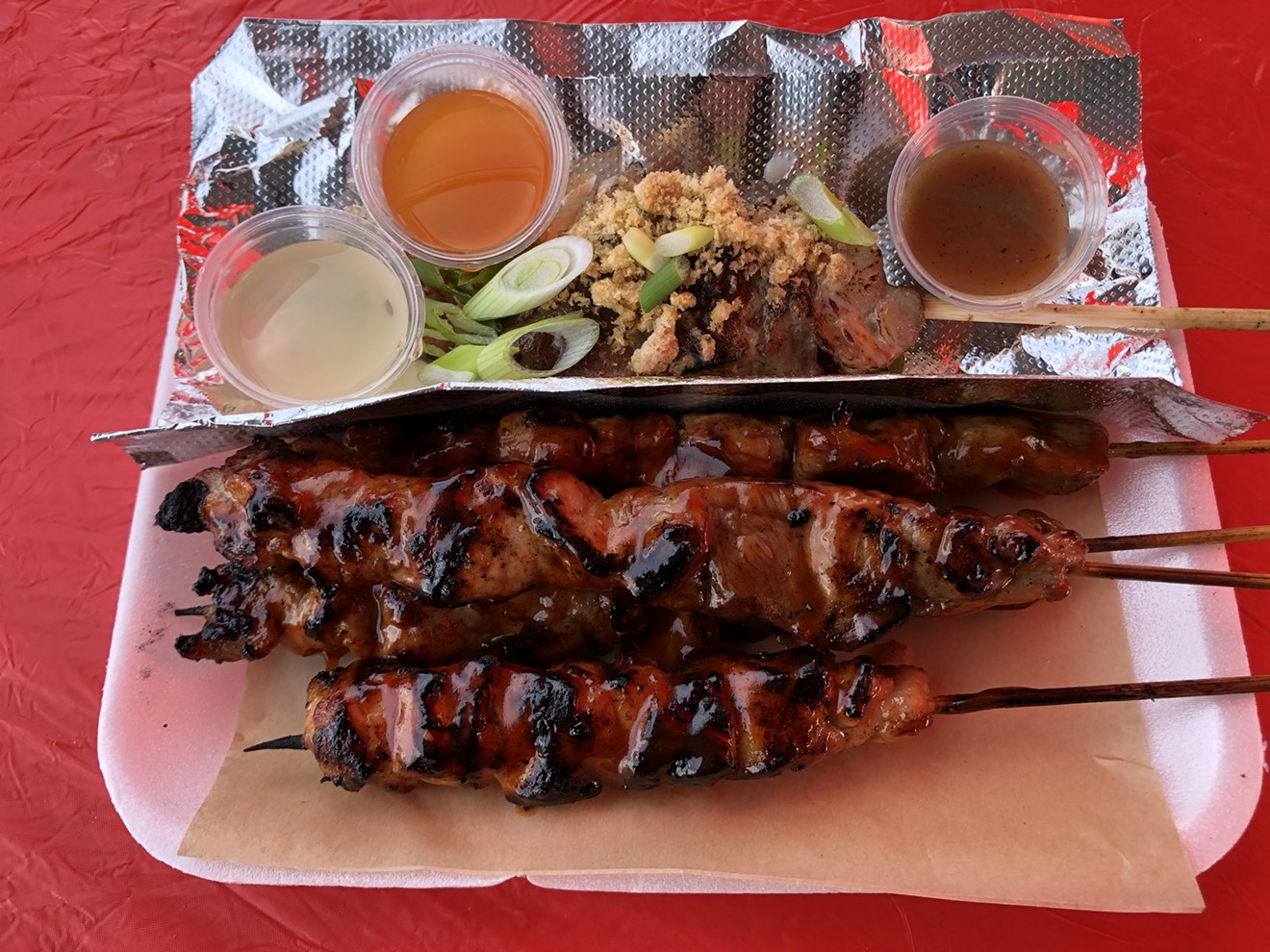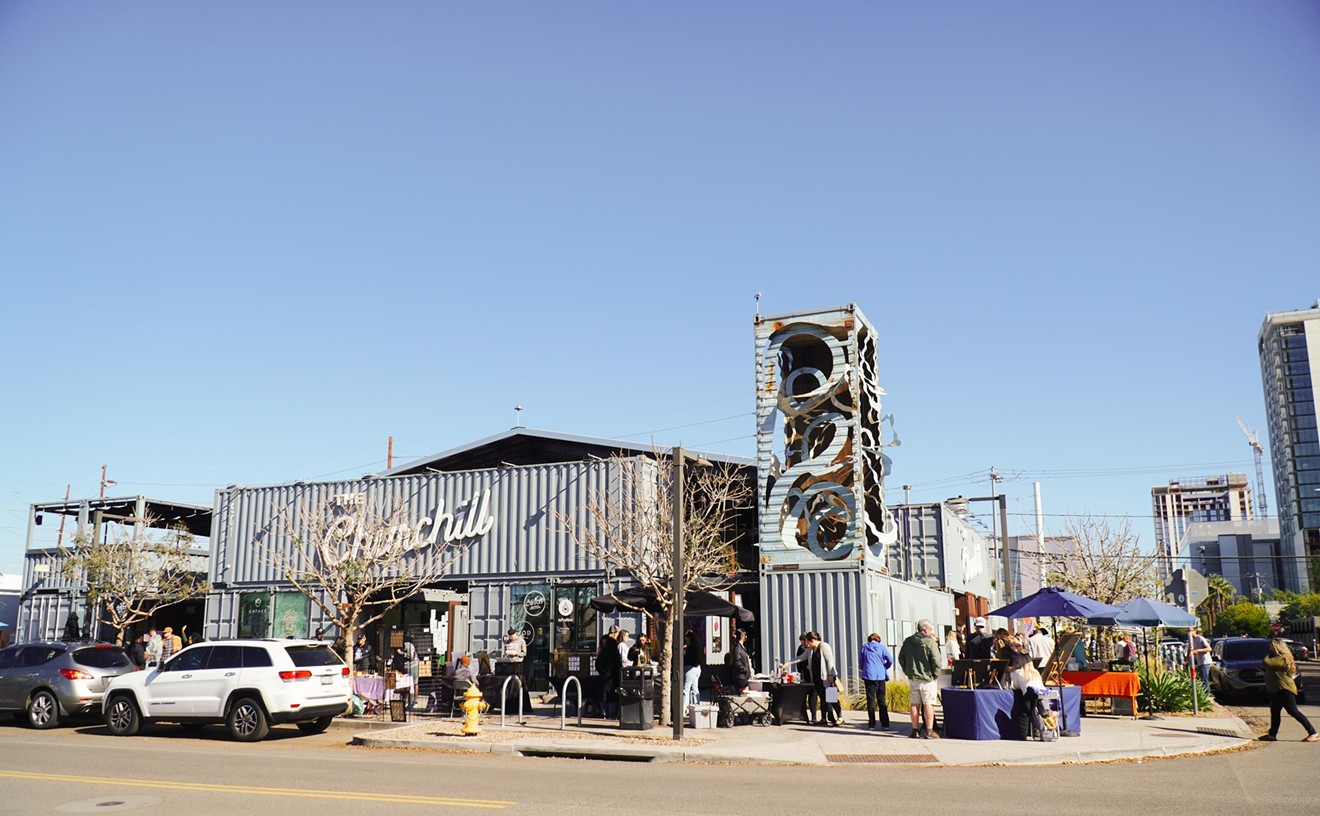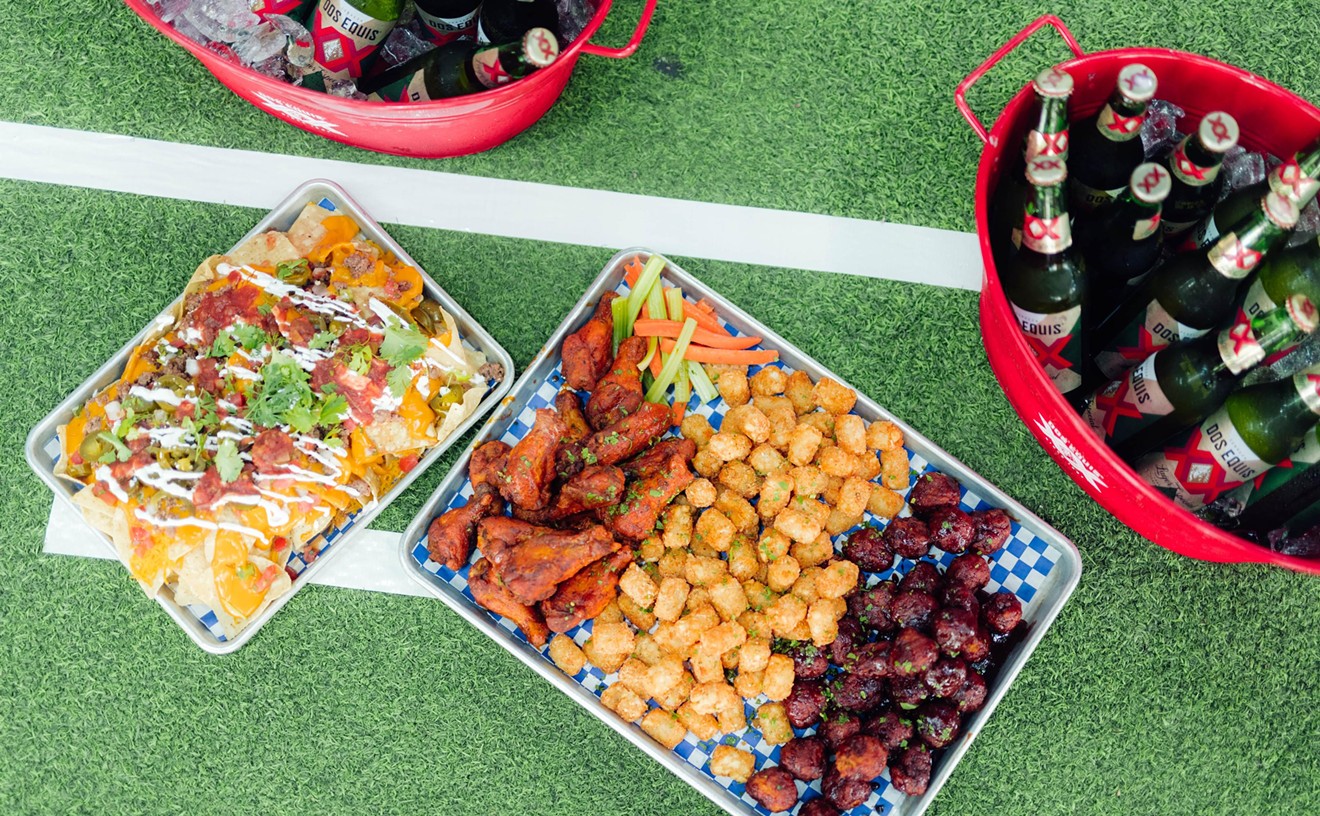Over the canopies and through the paved lanes of the Uptown Farmers Market, a tangle of cooking smells drifts. It might be faint and then strong, a note of kettle-blasted corn here, of hot-fried empanadas there. As you walk, browsing, the aromas combine and tease apart, evolve as you go, the vendors changing, your nose as much as your eyes leading you to lunch should you be hungry. And if the scent of charcoal pierces you, you might end up at Toduken — Filipino-Inspired Skewers.
Since May, Toduken has been grilling Filipino skewers and more.
Behind a tarp of clear and blue-and-yellow, three or four vendors bustle, laying meat onto platters, adding sauce cups, penning new orders, and relaying them to John Cornelio, who captains the grill out back. Sleeves short, wearing dark sunglasses, standing before distant palm trees, he carefully flips meat with his hands, chicken and pork skewers sizzling over a wide, ashy cairn of charcoal.
“In my language,” he says of Toduken, his stand's name, “that means ‘to skewer’ or ‘things that are going to be skewered.’”
His native language is Ilocano, one of the 150-plus languages spoken in the Philippines. Cornelio was born on the islands, where America waged a war from 1899 to 1902. His story begins in Camiling, Tarlac, east across the South China Sea from Vietnam. But it soon shifts.
When he was 2, his family moved to Alaska.
The food at Toduken reflects how Alaskan Filipinos like his father grilled. “It’s based on the barbecue you find back in the Philippines, all kinds of meat and offal cooked to order,” he says. But it reflects prismatically, for Cornelio adds his own tinkerings. In the Valley, Cornelio has cooked at Gadzooks, Matt’s Big Breakfast, and Rusconi’s American Kitchen. One day in 2017, he decided that cooking food far from his roots “wasn’t really me.” So he went to the Philippines, ate barbecue, started making barbecue close to that of his dad, and fell in love with cooking again.
“I looked back, and I thought I want to cook Philippine food,” he says.
At Toduken, friends and family offer their time to help Cornelio serve his food. He calls Toduken “Philippine-inspired,” because of his calculated steps away from tradition. Some touches are Alaskan-Filipino, like adding banana-ketchup sauce at the end of grilling, rather than at the marinade stage. Other touches are more his own, like re-creating lechon baboy, a style of whole-roasted pig, using just the “money muscle,” a cut prized in American competitive barbecue. At essence, Cornelio hopes to take dishes “near and dear to my heart, and try to do something more contemporary with them.”
Lechon baboy. Plus other specials like pork ribs, bistek, and pork belly. Simple skewers.
The skewers sizzle on their smoking grates, speaking a language known by all. Pork. Chicken. A vegan version. Before grilling, Cornelio marinates meat like chicken thighs in his blend of soy, 7UP, garlic, onion, cane sugar, and calamansi. Known as “Philippine lime,” calamansi is a citrus native to the islands that can be grown in Arizona. The craftsmanship of the skewers, though, begins before flavoring: with the cutting. “I got the cutting and skewering of the chicken from Japanese kushiyaki style,” Cornelio says.
The skewers emerge from the grill and banana-ketchup slathering charred, moist, and glistening a vibrant dark red. Chicken and pork are two skewers for $7. The sauce and marinade meld into some distant cousin of classical American barbecue, but lighter, with less spicing and a subtler, more tropical sweetness.
Two sauces that fall into the dipping sauce family of sawsawan sidekick skewers: a bracing, garlicky shot of cane vinegar, cane sugar, and allium, plus the same elixir, only spiked with chiles, like red Thai chiles and pimentos. Both give grilled meat balance, velocity, dimension.
Beyond the skewers, what Toduken cooks will vary by the day, including that lechon baboy.
This is a succulent riff on a great food of the world hard to find in metro Phoenix. One source, though irregular, is Brian Webb. In March, Webb roasted a 38-pound suckling pig over charcoal for lechon baboy served at Hot Noodles, Cold Sake. Starting at 5 p.m., the ramen shop swelled with people watching Webb hack through lacquered skin to free lemongrass-scented pork. Webb learned to cook lechon baboy through his wife’s family in the Philippines, and hopes to sell it next year, like Toduken, at a farmers market.
Toduken, though available just Saturdays at the Uptown Phoenix Farmers Market and at one-off events, is a more regular source of lechon baboy — though Cornelio doesn’t roast a whole pig.
Instead, he tenderizes the money muscle by sous vide, then sizzles it on his grill. The compact, juicy meat gets a lemongrass vinaigrette, chicharron, and a final topping of fried shallot and green onion, thickly slashed. It’s an intensely flavorful and powerfully beautiful few bites of food — what your soul craves when you get that first primal whiff of burning charcoal.
[
{
"name": "Air - MediumRectangle - Inline Content - Mobile Display Size",
"component": "18478561",
"insertPoint": "2",
"requiredCountToDisplay": "2"
},{
"name": "Editor Picks",
"component": "16759093",
"insertPoint": "4",
"requiredCountToDisplay": "1"
},{
"name": "Inline Links",
"component": "17980324",
"insertPoint": "8th",
"startingPoint": 8,
"requiredCountToDisplay": "7",
"maxInsertions": 25
},{
"name": "Air - MediumRectangle - Combo - Inline Content",
"component": "16759092",
"insertPoint": "8th",
"startingPoint": 8,
"requiredCountToDisplay": "7",
"maxInsertions": 25
},{
"name": "Inline Links",
"component": "17980324",
"insertPoint": "8th",
"startingPoint": 12,
"requiredCountToDisplay": "11",
"maxInsertions": 24
},{
"name": "Air - Leaderboard Tower - Combo - Inline Content",
"component": "16759094",
"insertPoint": "8th",
"startingPoint": 12,
"requiredCountToDisplay": "11",
"maxInsertions": 24
}
]














